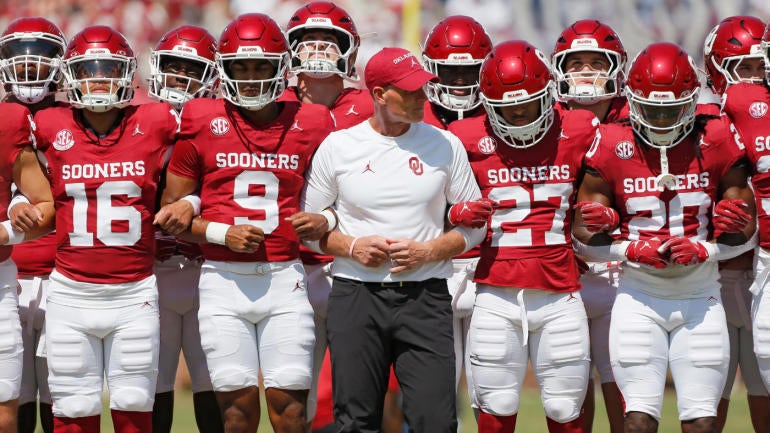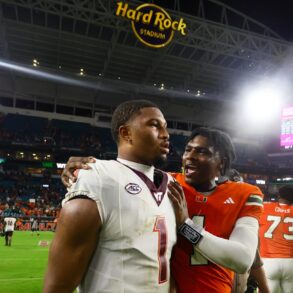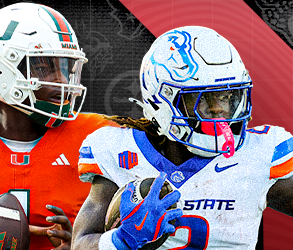
After an extensive coordinator search that saw Oklahoma weave through potential candidates like Jim Knowles, the Sooners finally have their new defensive play caller: head coach Brent Venables. Venables, a longtime former defensive coordinator himself, will now, in essence, return to that role while still operating Oklahoma’s entire program.
To assist in the transition, Oklahoma also announced the hiring of former Arkansas State defensive coordinator Nate Dreiling as inside linebackers coach and former Clemson defensive coordinator (and Venables disciple) Wes Goodwin as an assistant linebackers coach.
“I have reflected on all facets of our program over the past several weeks,” Venables said in a statement. “Since I was hired as head coach, we have carefully assembled the defensive personnel and scheme that is suited to compete at the highest level, and we’ve built a deep and talented roster ready for the moment. I have high expectations for our program and will do everything in my power to achieve our goals for our players. To that end, I will take over defensive play-calling responsibilities for the 2025 season.”
Venables’ decision comes after Oklahoma lost sitting defensive coordinator Zac Alley to West Virginia after he served just one season with the Sooners. Venables is also expanding his direct responsibilities in the wake of another 6-7 season — capped by a loss against Navy in the Armed Forces Bowl — that saw Oklahoma post a 2-6 conference record in its first season with the SEC.
With that, Oklahoma posted its second losing season in three years under Venables. Take away Oklahoma’s 10-3 effort in 2023, and Venables is 12-14 with a conference showing of 5-12 while leading one of college football’s most storied programs.
Suffice to say, the pressure to perform is mounting. So Venables asserting more control on the side of the ball that he spent a career building around, especially after Oklahoma missed on some big swings, makes sense on paper.
Will this move work out for Venables, Oklahoma?
Oklahoma’s struggles in 2024 were multi-faceted, but the defense had its fair share of letdowns. The Sooners finished a respectable 19th nationally in total defense (318.2 yards per game) and 29th in scoring defense while allowing 21.54 points per game. They were especially dominant in a stunning late-season upset of Alabama where they held the Crimson Tide’s explosive offense to a season-low three points.
But Oklahoma also surrendered at least 25 points in six of its eight SEC contests, including four games in which the opponent was able to exceed 30 points. All six of those games resulted in a loss.
While plenty of the blame can be placed firmly on Alley as Oklahoma’s primary play-caller, Oklahoma’s defense still had Venables’ DNA all over it. It’s probably not a coincidence that Alley was the second defensive coordinator of Venables’ three-year tenure.
Venables’ history suggests that he’ll be able to get Oklahoma’s defense back on the upswing, though. He was previously a co-defensive coordinator, and then defensive coordinator, with the Sooners from 1999-2011. He won a BCS national championship and seven Big 12 titles working under legendary coach Bob Stoops.
From 2012-21, Venables helped Clemson become a mainstay in the College Football Playoff as the Tigers’ defensive coordinator. He was a key figure on two national title-winning teams and helped Clemson win six straight ACC championships from 2015-20.
Venables’ defenses constantly ranked at or around the top of most major metrics. He’s one of the best defensive minds in the sport’s history, and Oklahoma’s unit should benefit from his direct guidance.
The major drawback here is that Venables’ latest move magnifies significant criticism against him. Though the 54-year-old Venables has been a full-time coach, in some capacity, since 1996, this is his first time as the true figurehead for a program.
Naturally, given his inexperience and Oklahoma’s lackluster results thus far, there are questions about his ability to actually direct a football team. Coaches have plenty of responsibilities that transcend the actual gameday operation, and adding direct defensive preparation and play-calling to his plate may take Venables’ attention away from some of those crucial details.
Hiring two former defensive coordinators in Dreiling and Goodwin was a good decision, especially given Goodwin’s experience in Venables’ system from their time collaborating at Clemson. They know what it takes to run a defense and can help alleviate some of that burden when Venables’ attention has to be elsewhere.
Venables also hired Ben Arbuckle to run his offense after one season of offensive coordinators Seth Littrell, Joe Jon Finley and Kevin Johns. Washington State had one of last season’s top offensive units under Arbuckle, who will bring some fresh new ideas to an Oklahoma offense that has grown stagnant.
He should have plenty of free reign with Venables dedicating more time to defense. How Arbuckle pans out will be crucial to Oklahoma’s 2025 season.
In essence, Venables’ decision to become Oklahoma’s de facto defensive coordinator seems like an effort to take a more direct approach in turning the Sooners’ fortunes around. While Oklahoma’s defense should reap the immediate reward, it will take some more growth from Venables as a “CEO” head coach, and tremendous effort from Oklahoma’s other units, to really get things on the right track.
This post was originally published on this site be sure to check out more of their content.




